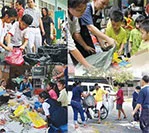SUSTAINABLE DEVELOPMENT: Community recycling brings social benefits
RECYCLING campaigns have been run by the government since the 1990s, and the concept of 3Rs (reduce, reuse and recycle) is well established. However, for a layperson, not much is known about the process beyond the tri-coloured recycling bins and old newspaper collectors in lorries with loudspeakers.
Some weeks ago, I had the opportunity to visit a recycling station run by volunteers of the Taiwan Buddhist Tzu-Chi Foundation Malaysia (Tzu-Chi).
Tzu-Chi is a Buddhist association that originated in Taiwan in 1966, and has been registered in Malaysia as a foundation since 1996.
Since 1990, the founder, Master Cheng Yen, enlisted environmental protection as one of the organisation’s “8 Charitable Footprints”.
Her followers from all over the world are urged to recycle as part of their service in practising their faith.
In Malaysia, Tzu-Chi has about 1,000 recycling stations and collection points in Malaysia, with about 13,500 volunteers involved in community recycling.
On a Tuesday morning, the recycling station in Jinjang, Kuala Lumpur, was teeming with housewives and retired people, weaving through the bags of sorted and unsorted recyclables.
The atmosphere was bustling and friendly, as the volunteers chatted while they busied themselves in sections of plastics, paper and used clothes. My guide was a volunteer who walked me through the recycling process. “We open three times a week for people to help with collection and sorting. This is where we put our unsorted rubbish,” she said.
“‘Resource’, not ‘rubbish’,” interrupted an elderly woman passing by with a bag of plastics.
Used clothes and repaired appliances that are in good condition are sold at low prices at Tzu-Chi’s second-hand centres.
Certain types of plastics can be processed into thread that is then woven into clothes. Old newspapers are unfolded and smoothened page by page, and sold to vegetable vendors, who use the papers to wrap their vegetables.
Proper sorting and processing of recyclables increase their market value. The money collected is channelled to Tzu-Chi’s operations and charity missions.
Through talking with the volunteers, it was apparent that they are knowledgeable about the overarching concept of recycling, the processes involved, and the market for recyclables.
It is no secret that recycling is a profitable business. Zhang Yin, one of the richest women in China, made her fortune through the recycled paper industry.
However, this is not the lesson that I took home that day. The volunteers did not recycle to earn money.
Even though they understood that their actions brought in income for Tzu-Chi, it is far from the only benefit that they derive from the experience.
The volunteers also benefit from recycling.
The focus on the process of recycling instead of the outcomes brings forth interesting reflections.
Firstly, while collecting and sorting through waste, volunteers experience gratification in preserving the environment, and reap the meditative effect of doing repetitive and manual work. To some, recycling fulfils them spiritually and heightens their appreciation of life. Volunteers suffering from depression experience positive effects as well.
Secondly, recycling is a means to rekindle the community spirit and solidarity with living beings. Although Tzu-Chi is a Buddhist organisation, their volunteers are not limited to Buddhists, as people from all walks of life come together for a common purpose.
The recycling stations double as community centres.
As people work together, they also eat together and laugh together. The positive environment cultivates friendships and networks among people. Thirdly, and perhaps most importantly, through recycling, volunteers learn about the lifecycle of products. Volunteers spoke of concepts like “zero waste” and “cradle to cradle”.
The sight of mountains of discarded household products changes their buying habits, as they learn about the environmental problems created by overconsumption. The experiential learning process of recycling is an effective form of environmental education, because it shifts the mindset fundamentally to trigger behavioural change.
Once converted, they then bring the understanding back to their social circles, spreading the message further. Last year, Malaysians produced an estimated 33,000 tonnes of solid waste every day, exceeding the projected figure of 30,000 tonnes per day by 2020.
In a year, 12 million tonnes of garbage are carted off in lorries, accumulated in overflowing landfills, while people protest about incinerators to be built in their backyards. Recycling as a matter of redirecting waste back to the production line is a solution mostly overlooked, evidenced by the paltry household recycling rate of 9.5 per cent. The financial and environmental benefits of recycling are well understood. The social dimension is also nothing new. It aligns with the spirit of gotong-royong, which is part of our Malaysian culture. When recycling is done in a socially beneficial way, it fits in the social economy, as a vehicle towards sustainable development. Recycling is good. Recycling as a community is even better. Now the question is: why aren’t we organising more of it?
Article by Dr Jun-E Tan which appeared in New Straits Times, Oct. 14, 2014





